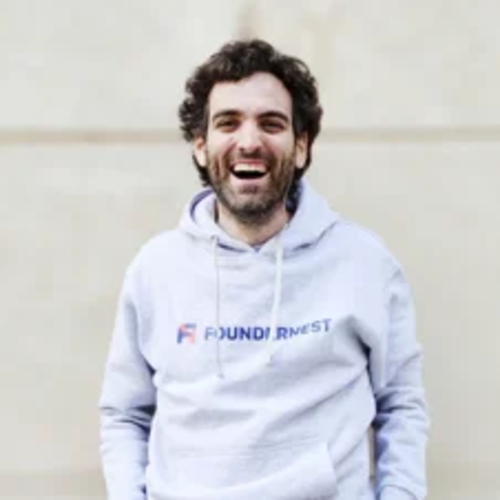Rachel Meyers grew up in a lower-middle-income “concrete jungle” in the Coney Island village of southern Brooklyn.
The apartments, owned by Trump family patriarch Fred Trump — yes, that Trump — had “no grass, no trees,” but there was a lot of one thing that Meyers loved: People. Thousands of them. Not only was it great for trick or treating —“I got so much candy because there were 20 apartments on one floor. Imagine how much real estate you can cover.” But it was great for a kid who thrived on social interaction. And Meyers is nothing if not a social butterfly.
“For me it was fantastic, not knowing any better,” she says. “Invite me to a party, I’m there. Any party, I’m there.”
Meyers admits that makes her a bit of an anomaly for a scientist, but that proclivity for all things people has served her well during her biopharma career, including in her current role as chief scientific officer at Faze Medicines, a biotech company developing therapeutics based on the new science of biomolecular condensates.
“I’m interested in talking to people and understanding how they think and hearing about new ideas,” she says. “I love to talk about new thoughts and ideas in science.”
That’s perfect for being a leader at Faze, which launched in December 2020 with $81 million of series A financing led by Third Rock Ventures (the firm out of which the company was spawned when Meyers was an entrepreneur in residence there) with participants that included Novartis Venture Fund, Eli Lilly and Co., and AbbVie Ventures.
The company’s niche
What has made Faze attractive is that they’re all about “new thoughts and ideas.” In fact, if you’re not familiar with biomolecular condensates and the science surrounding them, you’re not alone.
“This field has really only come into its own in the last five years,” she says.
According to the company, biomolecular condensates are “membrane-less clusters of molecules, such as proteins and nucleic acids, that dynamically organize to perform a wide array of cell functions.”
“The disruption of that mechanism, of the way in which these molecules come together, has been linked to a variety of diseases,” Meyers says, including neurodegenerative disorders like amyotrophic lateral sclerosis (ALS), known as Lou Gehrig’s disease.
Companies like Faze are studying the process by which biomolecular condensates come together and the ways in which they’re dysregulated and contribute to disease; along with strategies for developing drugs that could correct that dysregulation, and therefore, correct disease, Meyers explains.
"Our goal is to prove the idea that the whole company is based on."

Rachel Meyers
Chief scientific officer, Faze Medicines
Last week, a perspective study published in Nature and co-authored by the chief scientific officer of another company in the field, Dewpoint Therapeutics, outlined how modulating biomolecular condensates could revolutionize drug discovery.
“It’s a new way of thinking about old diseases,” Meyers says. “I would argue to you that there will be a continuing stream of diseases shown to be linked to condensation, and the real holy grail will be to figure out the strategy to make the correction.”
Finding joy in the science and people
While Meyers and Faze might be chasing that “holy grail” in the long term, she finds joy in the short term of her job: Of talking with people about new ideas, learning, making personal connections and the excitement of discovery.
“Joy in science comes from the day-to-day, week-to-week thinking about an experiment; reading about a new idea; making a new connection between the structure and some piece of biology” she says. “It’s a gift to be able to talk about science and think about science, I believe.”
Meyers has been enjoying that gift throughout her career.
Prior to joining Third Rock Ventures and starting Faze, Meyers spent more than 13 years at Alnylam Pharmaceuticals, and before that, at Millennium Pharmaceuticals. Now, as she leads a new company that launched during the COVID-19 pandemic, she’s still getting used to the new world of video meetings and virtual connection, which is especially hard for someone who values personal relationships so deeply. She’s the kind of person who wouldn’t flinch at flying to Europe for an overnight trip if it meant that she could attend a meeting with her colleagues.
“I’m very much used to meeting people, and having interactions, and being face-to-face, and cultivating relationships in person,” she says.
Still, she’s been able to adapt, and in so doing, continues to apply important lessons as a leader. Among them is the importance of setting big, bold goals that feel almost unattainable, which is what they’ve done at Faze as they work to demonstrate the validity of the emerging science.
“Our goal is to prove the idea that the whole company is based on: Can we develop a pharmacologic agent that specifically engages a target, alters a condensate and impacts disease?” she says. “We have set very audacious goals to try to do that in the very near term.”
But even with science and discovery at the forefront, Meyers has never lost sight of the importance of personal connections and how crucial that is in building a business and defining its culture.
“It’s actually OK and good to be a human in this business, which is very serious, and male dominated. Showing your human side is OK, and in fact, I’ve found it to be really positive,” she says. “I try to be human, and I try to see the humanity in other people. The good, the bad, the foibles.”
“It’s a gift to be able to talk about science and think about science.”

Rachel Meyers
Chief scientific officer, Faze Medicines
Hers is a career that’s based on constant learning, joy in science, and most importantly, talking to and connecting with people by asking questions and being genuinely curious about them, and therefore, curious about the world and its mysteries.
“As I’ve learned more, I’ve figured out how much I don’t know … The more and more stuff you do and wrap your arms around, the more you see the expansiveness of the world, and I have maintained the ability to express what I don’t know,” she says. “I’m comfortable in my not knowing and asking, and I think it’s a really important thing for people to do.”










